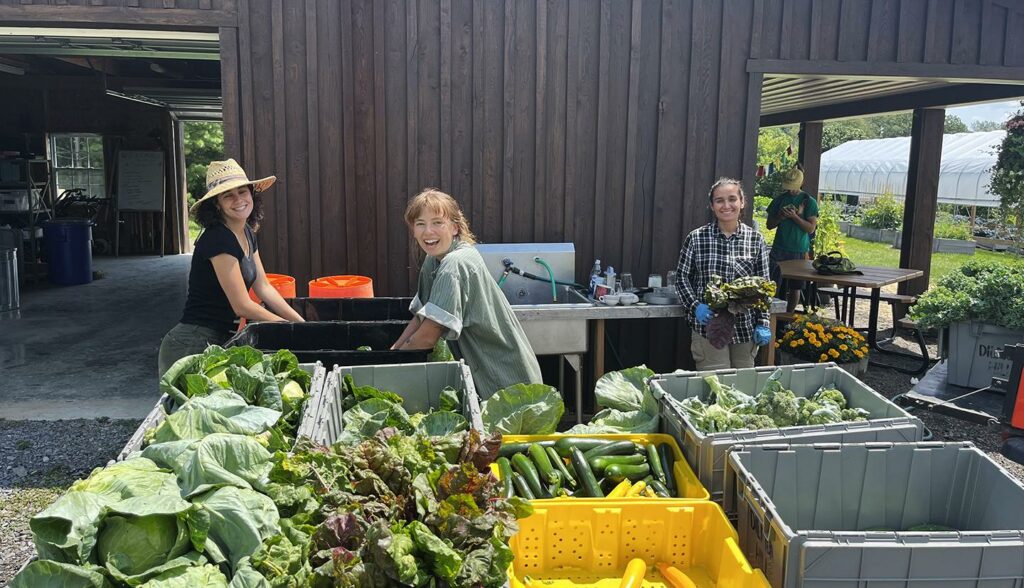Students Grow Plants and Community at Dilmun Hill
Undergraduates manage day-to-day operations at Dilmun Hill Student Farm, which was envisioned 30 years ago.
For the past almost-30 years, a small group of undergraduates has worked together to run Dilmun Hill Student Farm. With support from the Cornell University Agricultural Experiment Station (Cornell AES), Dilmun’s student managers choose which crops to plant, how to grow them and where to market the produce. For many student managers, the experience is a highlight of their time at Cornell.
“I wouldn’t change my time at Dilmun Hill for anything else,” said Raymond Pan ’25, a 2023 farm manager. “The things I’ve learned and the relationships I’ve established through Dilmun have definitely changed my Cornell experience.”
Dilmun was first envisioned in 1994, and the first growing season was in 1996. Each year, three to four students are hired as farm managers, starting part-time in the spring, growing to full-time over the summer and continuing part-time in the fall. In addition to raising crops, the role includes supporting Dilmun’s educational mission, such as hosting student research experiments and welcoming a variety of classes to the farm. Courses that regularly visit Dilmun Hill address topics like sustainable agriculture, food justice, soil science, agricultural machinery and food cycles.
Ryan Maher, organic coordinator for Cornell AES, is the farm supervisor and provides support, training and continuity for the managers, but leaves most decision making up to the students.
“The thing that makes Dilmun so impactful for students is that they have real ownership of the farm, and the decision making and the learning experience,” Maher said. “It’s a pretty amazing responsibility, but they are making day-to-day management decisions on the farm, from thinking through the markets that they have available to them, to what that means for crop planning and sales of their produce, to developing daily, weekly and monthly work plans to actualize those goals.”
Students last year sold most of their produce through a summer community-supported agriculture (CSA) program, in which other students and community members paid a set rate for a weekly share of produce. They also sold via pop-up farm stands on campus and through Anabel’s Grocery, a student-led grocery store in Anabel Taylor Hall. Students donated excess produce to Ithaca’s Friendship Donations Network.

2023 farm managers Willa Gagnon and Kaitlyn Feely with summer intern Sepehra Azami.
Kaitlyn Feely ’24, an agricultural science major, hopes to own a farm someday, so being a 2023 manager has provided an invaluable experience, she said.
“I’m definitely the type of person who needs a balance between computer, school assignments and real, tangible farm work – I need to be with plants and soil,” Feely said. “There was so much energy and excitement, showing up everyday and feeling so connected to the land and to my co-workers. Dilmun is such a special corner of Cornell. It’s really an oasis for me.”
Collaborating with fellow farm managers is both the most rewarding and most challenging aspect of working at Dilmun, the students said. The role is open to any undergraduate student on campus, with no required major or prerequisite courses, so student managers bring a wide array of perspectives and priorities with them.
“With all of us coming from different backgrounds, we have different thoughts and ideas, but there’s only one space. So talking through what we’re going to do is a big challenge but also really rewarding when it comes together,” said Pan, an environment and sustainability major. Pan, for example, spearheaded a new effort last year to establish a “pollinator garden” with the goal of supporting wild bees and other pollinators. The flowers he grew were a hit with customers and provided another source of income for the farm.
Students can also become involved at Dilmun Hill through the Dilmun Hill Club, and attend any of the farm’s community events, dinners or work parties.
“Working on a farm is very hard work, but it’s so gratifying to see the process happen – from seeds to harvest – and to know that you’re providing nutrition to someone,” Maher said. “Cornell is a really big place, and Dilmun provides a community around food and farming that means a lot to students.”
This article originally appeared on CALS News.

